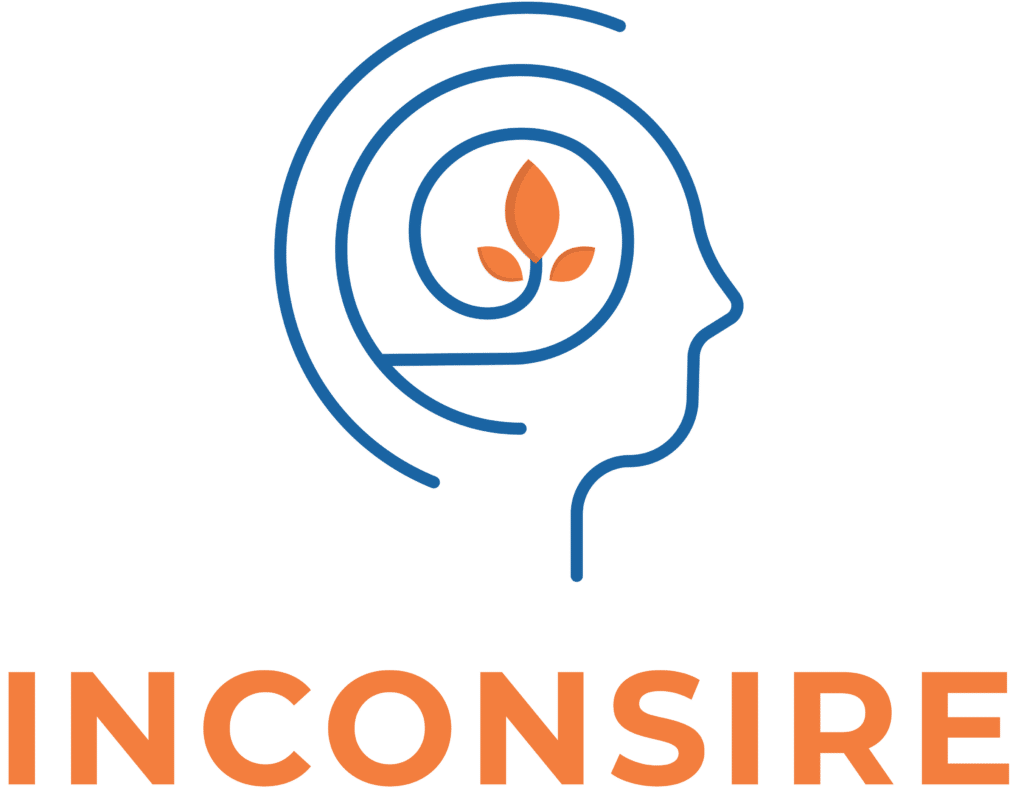Getting to the core of who “I” am and what “I” want is challenging for many people to answer when life feels so expansive. We might have a strong sense of who we are for a while, only to lose that sense just as quickly. We may experience dramatic shifts in our lives, develop new perceptions that question our actions and their purpose, and so on. Life is unpredictable, which influences our desire and willingness to act from time to time. Empowerment helps us navigate this.
What empowerment does for us is increase our control and influence over our own lives so we don’t feel such strong fluctuations in our motivation to create the life we want and identify what we need to do to feel well. Humans are fluid beings, constantly evolving, which can go in two directions. We can either find the drive to address the situations that arise and take control in our own way, or we can seek external help for situations we face that aid us in making our decisions. This is the essence of empowerment.
What is empowerment?
Empowerment is used in many different contexts. It can be applied to the labor market, for example, by examining how to foster employee well-being, which in turn creates a more efficient environment within a company. Empowerment can also arise in a political context, where, for instance, initiatives are explored to activate citizens’ desire to work through political actions. These are just two examples among many. Empowerment is studied across different areas to understand how it fosters growth both in others and in ourselves. In essence, how can we inspire others to pursue empowerment, and how can we empower ourselves?
Empowerment is defined as “the ability, desire, or will to take control of one’s own life.” The phrase “to take control of one’s own life” can vary in meaning. For some, life may feel entirely bleak, necessitating significant changes to improve well-being. For others, life might generally feel good, but there could be specific challenges, such as social or environmental influences, that affect well-being. For example, one might enjoy their job overall, but demotivating coworkers or work-related situations can dampen the desire to work. In such cases, it’s essential to ask oneself how to address these issues and handle them effectively.
In many situations, we might feel paralyzed and avoid confronting how something affects us, which can lead to powerlessness or disempowerment. This means relinquishing control over our lives and handing it over to others, as could easily happen in the example above. Alternatively, an empowered approach could be taken to “take control of” the situation, as it impacts our “life.”
Help for Self-Help
One of the key components of empowerment is seeking help for self-help. This concept is about acquiring the resources one doesn’t yet have but wishes to attain. It could involve emotional skills, which might lead someone to therapy to better understand their feelings. It might also involve gaining knowledge about performing a specific task by seeking experts to guide you, whether through a YouTube tutorial or by emailing someone experienced in what you’re attempting to learn.
Help for self-help is about learning from others and using that knowledge for your own or others’ benefit. It might involve equipping others with the skills and resources needed to handle tasks independently or fostering mindsets and attitudes that shape their approach to solving problems on their own. This principle of empowerment takes many forms but ultimately revolves around finding people who can prepare you to tackle challenges on your own.
Doubt and Empowerment
Empowerment is about uncovering the deeper reasons why we want to take control of our lives by fostering autonomy (self-determination or the right to make one’s own decisions) in individuals. This enables them to take decisive actions that enhance their well-being. Empowerment occurs when we consciously make choices based on independent thoughts that we can stand by.
We need to find our “why.” Why do we want to take control of our lives, and how do we gain the abilities to do so? This part is difficult for many, and there’s a reason for that. We are constantly changing; our motivation to do something shifts from one day to the next, leading to confusion and doubt in life.
There are many factors to consider when building a life, and doubt is an incredibly important tool to use in creating empowerment.
Doubt can help us create empowerment by examining it. We need to act on our doubts and figure out whether they can make us happier or not. Humans are naturally curious and result-driven, which stems from our doubts and the exploration of them. We must investigate what we don’t know and determine if what we’re doing works for us. But where do we begin our search? We start by looking inward and examining what makes us fundamentally happy.
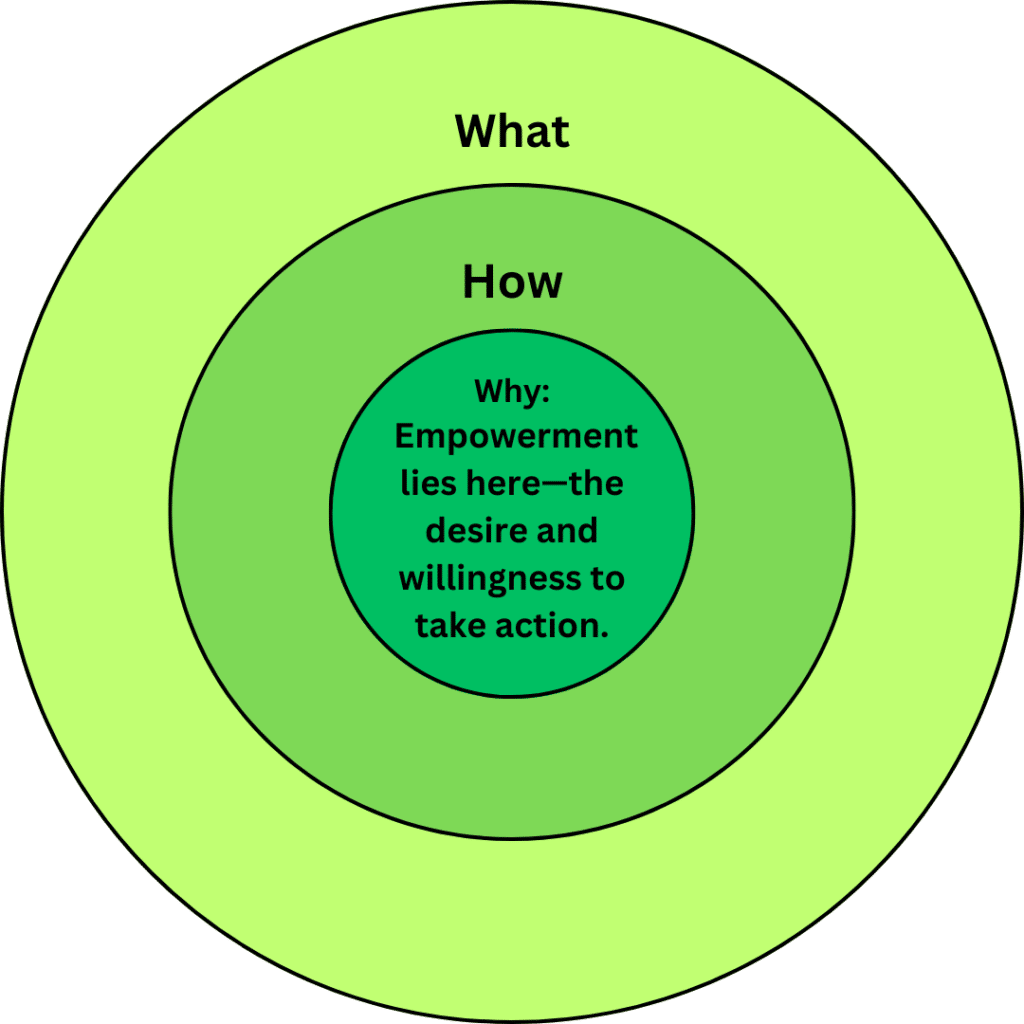
Presence
A state of presence is one where we experience enhanced self-esteem, heightened awareness, and a strong connection between our emotions and rationality. Presence can be result-oriented, producing healthy outcomes in our actions, which contribute to an empowered sense of life. When navigating doubt, presence can help us make the right choices by clarifying what “I” want. Presence fosters independent thoughts that deepen our understanding of what shapes our lives.
Understanding presence means viewing our “why” as a foundational aspect of our existence. Asking “why” challenges the beliefs we hold about ourselves, others, and the world—beliefs that are fundamental to our actions in life. Presence can break the limitations we’ve set for ourselves and allow us to create new ones. For example, it can address our self-esteem. To what extent do we respect and love ourselves? Self-esteem enables us to grow and make the choices “I” want.
Imagine that all your friends choose to attend a business school (HHX), but you feel strongly about enrolling in a general high school (STX) for the opportunities it might provide later. If this aligns with your sense of growth, then do it.
Presence helps us understand empowerment, act on what we desire, and feel the effects it has on our lives. It sharpens our mindset and outlook on our own lives, those who interact in them, and how we view the world. Presence is also what we need to understand what fosters our well-being and how our emotions and happiness are formed.
Well-being
When discussing taking control of our lives, it’s worth considering our well-being. Well-being encompasses the entirety of our lives and reflects our overall satisfaction with life. It is measured across six key areas:
- Work: What, why, and how we do for a living.
- Economy: How we use our money.
- Social: How our social surroundings influence us.
- Environment: Physical surroundings and its impact.
- Health: How our body and mind is connected.
- Intellect: How satisfied our mind is.
The more we connect these areas, the easier it becomes to forge a strong sense of empowerment. Well-being is created through our actions and the meaning behind them. Knowing why we act as we do enhances our motivation to act, which results in gaining control over our lives.
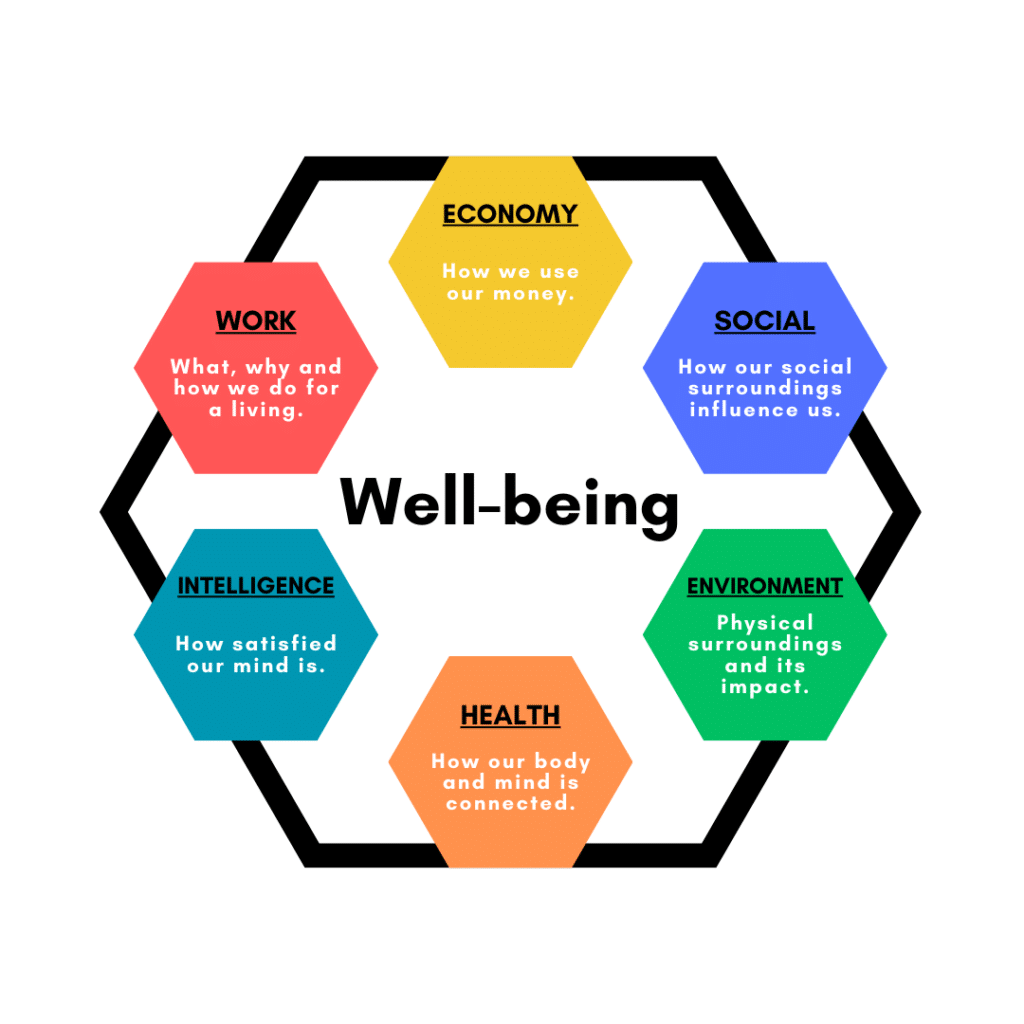
Well-being contributes to empowerment in various ways. For example, going to work—even if we don’t enjoy it most of the time—supports our finances, which allows us to afford social activities in environments we enjoy. Recognizing how work contributes to other areas of our lives can lead us to question how to optimize our work ethic and vision for work, fostering empowerment.
Understanding what we want and how we want it is essential across all areas of life, but most important is understanding why. While work may support our finances and leisure, understanding why we need to work helps solidify our sense of empowerment. By realizing the potential of work and its broader impact on other areas of life, we can enhance not only those areas but also the work itself.
Asking what, how, and why in all areas of life is crucial. This creates a connection between the different aspects of our lives, strengthening our overall well-being and instilling a greater desire to take control of our lives—the very essence of empowerment.
Happiness
When we talk about finding joy in what we do, it’s about discovering what truly makes us happy. Happiness is a broad and subjective concept, so we need to consider its two main forms: hedonistic happiness and eudaimonia. You can see an explanation of these two types of happiness in the figure below.
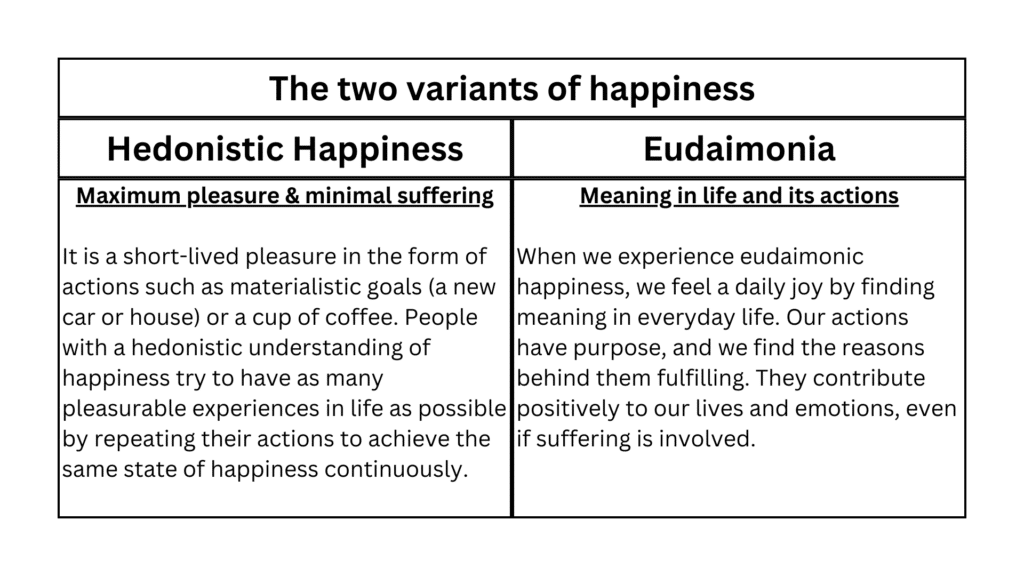
The type of happiness we should seek when fostering empowerment is a combination of both. We must utilize each type of happiness to its fullest potential. When figuring out what we truly want, we should focus on eudaimonic happiness—understanding what gives our actions meaning. This is the first step toward empowerment: identifying what makes us happy. However, this sense of happiness is not a permanent state, which is where hedonistic happiness comes in. Sometimes, we need to balance our pursuit of meaning by allowing ourselves to enjoy pleasure with minimal suffering.
It is the balance between these two types of happiness that creates empowerment. We might be highly productive individuals, but if we overcompensate for our sense of joy by constantly striving for productivity, we risk losing our motivation to continue, ultimately leading to disempowerment.
Emotions
Desire is not something that simply appears. As humans, we have different needs that drive our motivation to take action. But how can we influence our desire to do something and gain control over our own lives? To answer this, we need to look at our emotional life.
Emotions have a significant impact on our desire for life. Understanding how emotions affect us—both positively and negatively—can create empowerment. Being able to manage setbacks and hyperarousal is essential for fostering empowerment because it’s about acting on what we truly want to have control over in our lives.
When we talk about desire in the context of empowerment, we are really talking about control over our own lives. We may feel the urge to satisfy basic needs like eating, sexual pleasure, or sleep, which can be part of empowerment, but ultimately, it’s about making conscious choices about what we truly want. This means examining our desires in contrast to other aspects of our lives.
When we act based on emotions, our actions can fluctuate. One day, we may feel incredibly happy and want to buy our neighbor an ice cream, while the next day, we might be frustrated because something isn’t working, making us doubt our own competence.
When our emotions swing dramatically between highs and lows, we often lose control over our personal development and tend to fall back into old routines and habits.
To foster empowerment, we must calm ourselves and find peace in what we do. We need to confront the restlessness we feel, ask ourselves where it comes from, and find ways to soothe it.
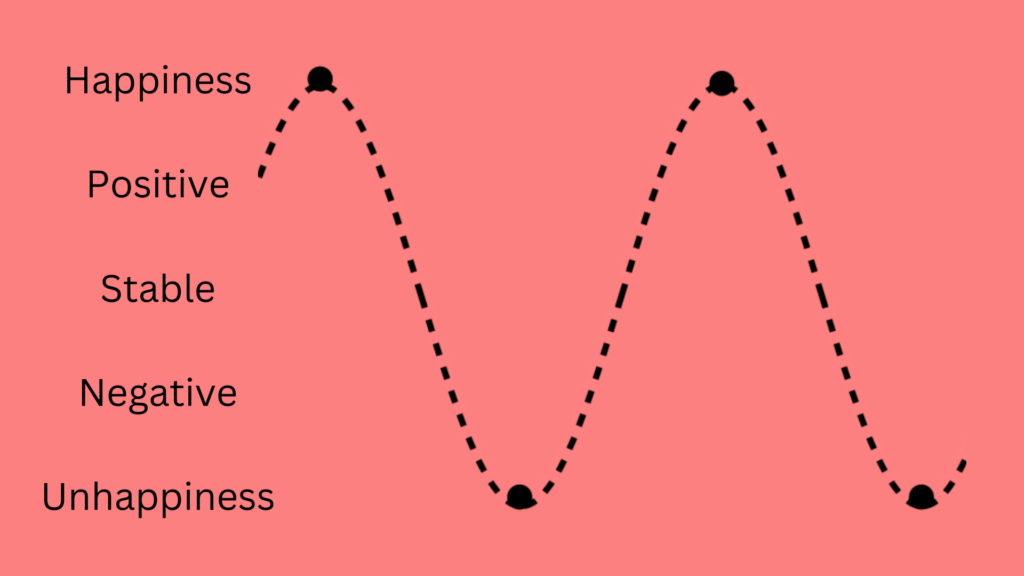
A stable emotional life, where we understand and control our emotions, enables us to create empowerment. When we manage our emotions effectively, we can develop into the person we want to be and create a stronger sense of purpose in life.
For some (or most), this might sound like a boring way to live, but the key takeaway is that when we are at peace, we can make decisions that truly align with what we want. This helps us avoid falling into deep emotional lows too often or for too long, allowing us to discover what truly brings us joy—leading to a more positive and fulfilling life.
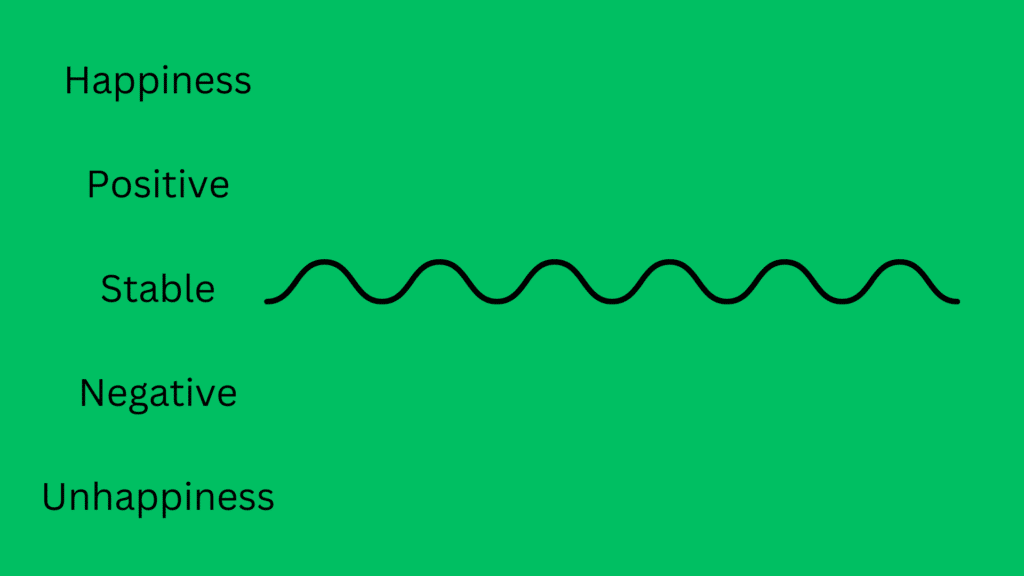
The Process of Empowerment
The process of empowerment involves stabilizing our desire and will for life. By raising awareness of what, how, and especially why we want control over our lives, we lay the foundation for empowerment.
Empowerment begins with strong self-esteem. When we feel grounded and present, we can regulate our emotions and thoughts in response to our circumstances. This inner calm strengthens our self-esteem and allows us to take control amidst the chaos we either create or find ourselves surrounded by.
Understanding that it’s okay to be “me” is essential. While some may see this as selfish, it’s actually about balance. Self-esteem grows when we love ourselves and seek the best for ourselves without overcompensating for the happiness of others. Empowerment involves finding the right balance between what we demand of ourselves and what we demand of others.
Be Proactive
Instead of simply reacting to what happens, take action as well. Take control of the present moment and act in a way that brings you joy by taking responsibility for your life, rather than avoiding responsibility and remaining stuck in inaction. Emotions exist to make us respond and act according to the situation we are in. If we feel frustrated or bottled up, it’s our system’s way of trying to release those emotions through action—and that’s exactly what we need to do. We must act on the emotions that arise within us to learn what empowers us, how it happens, and why it matters.
At times, we may also act irrationally, which is why we need to understand what we are feeling, how we handle it when we act irrationally, and why we need to do so. If we feel unfairly treated or experience intense negative emotions, these are the moments when taking action in our behavior and developing self-awareness becomes most crucial. It is in these situations that we need to learn how to find calm, understand why we should regain balance, and take the necessary steps to do so.
Regulate Your Emotional Life
The title might sound robotic at first, but this is something we as humans are fully capable of. Raise awareness of your emotions and their impact on you. Understand how your thoughts are tangled up behind them and how you can untangle and organize them. Regulating your emotional life is about processing your feelings through acceptance and acknowledgment. We cannot lie to ourselves—we must be honest and find healthier ways to release the emotions we carry.
There are many ways to regulate emotions—some people do it through physical activity, while others write down their thoughts. The key to emotional regulation is processing your emotions and understanding that it’s okay to feel whatever you feel, but that you are also responsible for working through those emotions. Sometimes, our emotions affect others, and in those cases, we must recognize it and apologize.
We need to understand that weakness and grief are factors that push our ego to defend itself. But if we can admit our vulnerabilities and sorrow, we become more honest with ourselves and better able to regulate our emotions—leading to healthier outcomes for both ourselves and those around us.
Cultivate Curiosity and Resilience
When working with empowerment, it can be frustrating when things don’t go as planned. If something feels too difficult or overwhelming, we tend to give up too quickly, which works against our desire to create empowerment.
Developing stamina and tolerance can be valuable tools for increasing resilience. Resilience helps us tone down our frustrations and awaken curiosity. One way to trigger our brain is by approaching challenges with curiosity. If we find homework boring, it might help to first understand why we need to do it. We take a deep breath and calmly try to organize what needs to be done. If we’ve tried to figure it out but still feel confused, we can take a step back and ask ourselves: Why do I feel completely stuck? What am I actually working with? By shifting our focus from frustration to curiosity, we enhance productivity and, in turn, foster empowerment.
Find Meaning in Your Actions
Finding meaning in our actions is central to empowerment. When what we do aligns with both joy and purpose, we experience fulfillment. If our current activities no longer bring joy, exploring new pursuits is essential. This process ensures that our actions contribute positively to both our lives and the lives of others.
Be Present
Today, we are highly productive and accomplish many tasks, unlike yesterday, when we might not have made the most of the day. Tomorrow could either resemble today or yesterday. But comparing our days leads nowhere. The only time we can take action is in the present—we cannot change the past or control the future.
When it comes to empowerment, we must seek the motivation to act now. We need to discover what we enjoy doing and be fully present in what is happening around us. This way, we engage in activities we genuinely want to do instead of being driven by bad habits or negative tendencies.
Conclusion on Empowerment
Empowerment is the ability, desire, and will to take control of our own lives. This is achieved by examining and addressing our doubts, deciding whether to rely on external help or to take the initiative ourselves. By becoming proactive rather than reactive, we unlock the potential to shape our lives with intention and purpose.
Enhanced Emotional Intelligence
Empowerment deepens our understanding of emotions, helping us identify which feelings we want to experience and share with others. It fosters emotional intelligence by teaching us to recognize what feels right and act accordingly. Challenging ourselves is a key part of this process, as it allows us to move beyond the safety mechanisms of the brain, such as the amygdala, which often seeks to maintain the status quo. Stepping outside our comfort zone helps break repetitive patterns and encourages growth. Empowerment drives us to critically confront our thoughts with an open mind, increasing awareness of our emotional lives.
Stronger Self-Esteem
Empowerment reinforces self-esteem by emphasizing the importance of prioritizing oneself. We cannot effectively help others without first helping ourselves. Understanding this principle is central to the concept of empowerment. When we discover the will, desire, and ability within us to take control of our lives, we can share that knowledge with others. Empowerment also teaches us to maintain calm and focus on self-care, reminding us of its significance in creating stability and balance.
Improved Conflict Management
Conflict management applies both externally—with friends, family, or public systems—and internally, within our own minds. Internal conflicts, such as uncertainty about what to feel, say, or do, can be resolved through empowerment by focusing on what is necessary to gain clarity and control over our lives. Once we manage our own lives effectively, we can better address external conflicts, leading to more harmonious interactions and resolutions.
